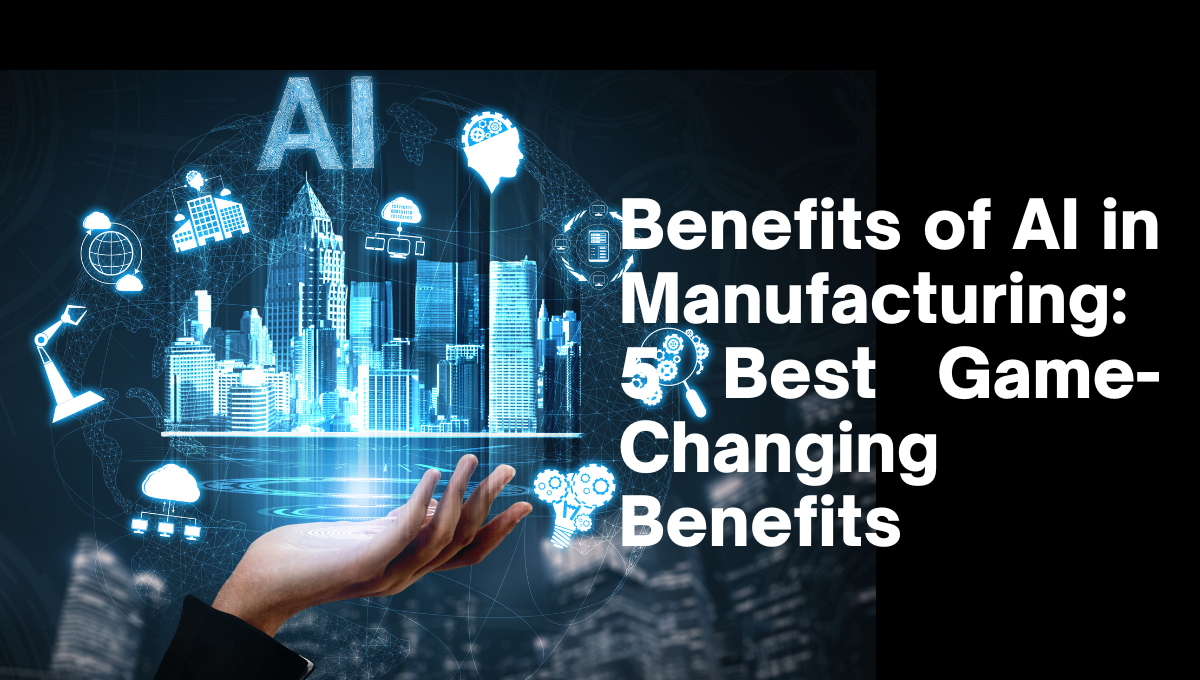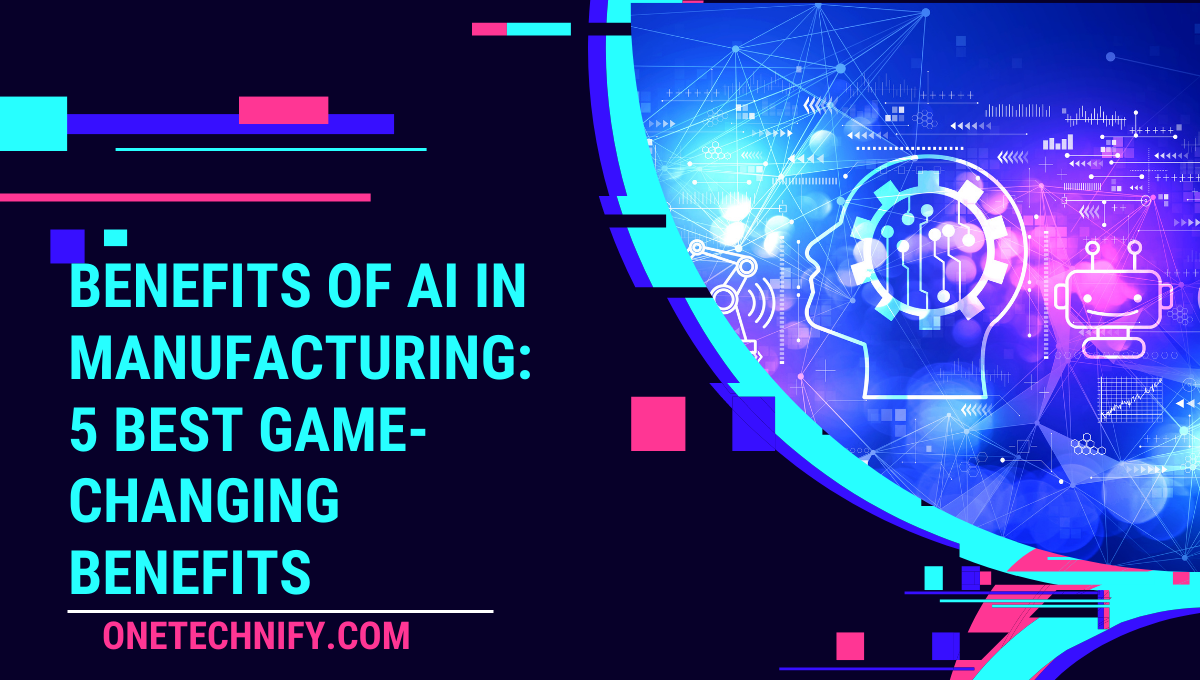Have you ever wondered how robots and machines, guided by artificial intelligence (AI), transform the factory floor? Engineers play a crucial role in this revolution in the manufacturing industry. Are you curious about the benefits of AI in manufacturing brings to the manufacturing sector and enterprises in their quest for innovation and efficiency? Are you interested in the latest research on this topic?
Companies in the manufacturing sector today face immense pressure to stay competitive in a rapidly evolving market. The advent of intelligent manufacturing has transformed how enterprises operate, allowing them to streamline processes and improve efficiency. Companies are embracing AI as a powerful tool to meet the challenge of optimizing production processes and driving innovation. These enterprises are utilizing engineers and robots to achieve their goals. With AI-powered robots, manufacturing companies can streamline operations, enhance productivity, and make data-driven decisions that lead to cost savings. Engineers in the enterprise can leverage these solutions to optimize their processes.
But what specific benefits does AI offer to companies and operators in the manufacturing realm? AI can significantly improve the efficiency of manufacturing plants and streamline the overall process. From predictive maintenance and quality control to supply chain optimization and intelligent inventory management, organizations in the manufacturing industry can use AI to transform every aspect of their process. AI has the potential to benefit operators by improving efficiency and accuracy. So, if organizations are ready to use AI in manufacturing and unlock its transformative potential, let’s get started!

Table of Contents
Essential Benefits of AI in Manufacturing
AI in manufacturing offers several benefits for organizations that can significantly improve productivity and competitiveness. By leveraging the power of AI technologies, organizations can make data-driven decisions, enhance operational agility, and gain a competitive edge in the manufacturing industry.
- With AI, organizations can analyze vast amounts of data to make data-driven decisions. Manufacturers can use AI to gain valuable insights. This enables them to make informed decisions based on real-time information with the help of an AI solution, leading to improved productivity and efficiency. AI algorithms can identify patterns, detect anomalies, and predict maintenance needs, allowing manufacturers to optimize their processes and reduce downtime.
- Operational agility and responsiveness: Implementing AI systems allows manufacturers to adapt to changing market demands quickly to adapt to changing market demands quickly. AI-powered automation streamlines production processes, making them more flexible and responsive. Manufacturers can adjust real-time production schedules based on demand fluctuations or supply chain disruptions. This enhances operational efficiency and reduces lead times.
- Competitive edge: By embracing AI technologies, manufacturers can stay ahead. AI-powered predictive analytics helps optimize inventory management by accurately forecasting demand patterns. This minimizes stockouts while avoiding excess inventory costs. Machine learning algorithms enable predictive maintenance, reducing unplanned downtime and optimizing equipment performance.
Streamlining Operations with AI Technology
- AI technology, specifically machine learning algorithms, can automate repetitive tasks within manufacturing processes. AI frees human resources to focus on more complex and value-added activities by taking over these mundane activities.
- Machine learning algorithms play a crucial role in analyzing vast amounts of data generated by manufacturing systems. They can identify process bottlenecks and inefficiencies that may otherwise go unnoticed. This analysis enables organizations to make data-driven decisions and take proactive measures to optimize their operations.
- One of the key benefits of AI technology is its ability to provide real-time monitoring and predictive analytics. AI systems can detect anomalies or deviations from normal operating conditions by continuously monitoring various aspects of production workflows. This allows operators to intervene promptly and prevent potential issues before they escalate.
- With the help of AI algorithms, manufacturing processes can be put on autopilot mode, ensuring consistent performance and reducing the risk of errors or variations. This level of automation improves overall efficiency while maintaining high standards in product quality.
Enhancing Production and Efficiency through AI

Advanced robotics powered by AI revolutionize the production process, delivering many benefits. By harnessing the capabilities of AI solutions, manufacturing companies can achieve better precision and speed on their assembly lines.
Intelligent scheduling algorithms are crucial in optimizing production sequences, minimizing downtime, and ensuring seamless operations. These algorithms leverage AI to analyze vast amounts of data, enabling manufacturers to streamline their processes effectively.
Furthermore, predictive maintenance utilizing machine learning has emerged as a game-changer for the manufacturing industry. By continuously monitoring equipment performance and analyzing historical data, AI-driven systems can predict potential failures before they occur. This proactive approach minimizes unexpected breakdowns and reduces costly downtime.
Revolutionizing Quality Control with AI Innovations
With the advent of artificial intelligence (AI) in manufacturing, quality control processes have been revolutionized, ensuring consistent product standards and enhancing overall product quality.
Computer vision systems powered by AI technology have proven to be highly effective in detecting defects more accurately than manual inspections. These systems use advanced algorithms to analyze visual data and identify even the tiny malefactions that may go unnoticed by human inspectors. By leveraging computer vision, manufacturers can significantly improve their ability to identify and address quality issues early on, preventing defective products from reaching consumers.
Another key benefit of AI in quality control is the application of machine learning algorithms to analyze sensor data. These algorithms can detect patterns and anomalies that indicate potential product quality issues before they become critical. By continuously monitoring sensor data, manufacturers can proactively address these issues, reducing waste and improving overall product quality.
Automated quality control processes are another significant advantage offered by AI innovations. With mechanical systems in place, manufacturers can ensure consistent adherence to product standards throughout the production process. This eliminates variations caused by human error and ensures that every item meets the required specifications. By streamlining and automating these processes, manufacturers can achieve higher levels of efficiency while maintaining superior product quality.
Reducing Operational Costs with AI in Manufacturing
- Optimized inventory management through demand forecasting reduces excess stock levels.
- Energy consumption can be optimized using machine learning algorithms for cost savings.
- Predictive analytics enable proactive maintenance, minimizing costly breakdowns.
AI technology has revolutionized the manufacturing industry by providing numerous benefits that help reduce operational costs. By harnessing the power of artificial intelligence, manufacturers can optimize their processes and make informed decisions to maximize efficiency and profitability.
One key area where AI proves invaluable is in inventory management. Through demand forecasting, AI algorithms analyze historical data and market trends to predict future demand accurately. This enables manufacturers to streamline inventory levels, reducing excess stock and minimizing storage costs. With optimized inventory management, companies can avoid overstocking or understocking situations, ensuring they have the right amount of products available.
Another significant cost-saving opportunity lies in energy consumption. Machine learning algorithms can analyze energy usage patterns and identify areas where optimization is possible. Manufacturers can minimize wastage and reduce overall energy expenses by implementing AI-driven energy management systems. This contributes to cost savings, and AI-powered predictive analytics detection aligns with sustainability goals by promoting eco-friendly practices within the manufacturing process.
Furthermore, Manufacturers can identify early warning signs of impending issues by monitoring sensor data and analyzing historical patterns, which play a crucial role in proactive maintenance strategies. By continuously monitoring equipment performance and analyzing data patterns, AI systems can detect potential issues before they escalate into costly breakdowns or production halts. This allows manufacturers to schedule necessary maintenance tasks efficiently, preventing unplanned downtime and expensive repairs.
Leveraging Predictive Maintenance and Analytics for Increased Output
Predictive maintenance, combined with advanced analytics, is revolutionizing the manufacturing industry. By harnessing the power of big data and employing machine learning models, manufacturers can unlock a range of benefits that enhance productivity and efficiency.
Preventing Unplanned Downtime with Predictive Maintenance
One significant advantage of leveraging predictive maintenance is detecting potential equipment failures before they occur. Manufacturers can identify early warning signs of impending issues by monitoring sensor data and analyzing historical patterns. This proactive approach allows them to schedule necessary repairs or replacements, preventing costly unplanned downtime. With predictive maintenance, heavy assets can operate smoothly without unexpected interruptions.
Optimizing Output Levels through Analyzing Production Data
Another way manufacturers benefit from advanced analytics is by analyzing production data to identify inefficiencies. Companies gain valuable insights into areas that require improvement by scrutinizing various performance metrics, such as cycle times and equipment utilization rates. Armed with this information, they can make targeted adjustments to optimize output levels accordingly. This ensures that production processes are streamlined, and resources are utilized efficiently.
Improving Overall Equipment Effectiveness (OEE) with Machine Learning Models
Machine learning models are crucial in improving overall equipment effectiveness (OEE). These models analyze vast amounts of data machines generate to uncover patterns and correlations that may not be immediately apparent to human operators. By I, Manufacturers can implement corrective measures effectively by identifying factors contributing to decreased performance or increased error; insights provided by machine learning enable them to fine-tune their operations for maximum efficiency and productivity.

Embracing the Power of AI in Manufacturing
In today’s rapidly evolving manufacturing landscape, embracing the power of AI is no longer just an option – it has become a necessity. The benefits of AI in manufacturing are immense, ranging from streamlining operations and enhancing production efficiency to revolutionizing quality control and reducing operational costs. By harnessing the potential of AI technology, manufacturers can unlock new levels of productivity, profitability, and competitiveness.
So what are you waiting for? It’s time to leverage the power of AI in your manufacturing processes. Implementing AI technologies such as machine learning algorithms and predictive analytics can optimize your operations, improve product quality, and reduce costs. Embrace this transformative technology to stay ahead in the race and make your mark in the manufacturing industry.
FAQs
Can AI help with demand forecasting?
Yes, AI can significantly assist with demand forecasting in manufacturing. By analyzing historical data, market trends, and various external factors using advanced algorithms, AI systems can provide accurate predictions for future demand patterns. This enables manufacturers to optimize their production schedules, inventory management, and supply chain operations more effectively.
How does AI enhance quality control?
AI enhances quality control by automating inspection processes through computer vision systems. These systems use cameras or sensors to capture images or data points from products during production or post-production stages. Machine learning algorithms then analyze these data points to identify defects or anomalies that human inspectors might miss. This improves the accuracy and speed of quality control and reduces human error.
Can AI be used for predictive maintenance?
Absolutely! Predictive maintenance is one of the key areas where AI excels in manufacturing. AI algorithms can predict when a machine will fail or require maintenance by continuously monitoring equipment performance data such as temperature, vibration levels, or energy consumption patterns. This allows manufacturers to schedule maintenance activities proactively rather than reactively when breakdowns occur unexpectedly.
Is AI expensive to implement in manufacturing?
While the cost of implementing AI in manufacturing can vary depending on factors such as the system’s complexity and the deployment scale, it is increasingly becoming more affordable. With advancements in technology and the availability of cloud-based AI platforms, manufacturers of all sizes can now access AI solutions at a reasonable cost. The long-term benefits and ROI that AI brings often outweigh the initial investment.
Can AI replace human workers in manufacturing?
AI is not meant to replace human workers but to augment their capabilities. While specific repetitive or dangerous tasks can be automated with AI, human expertise is still crucial for decision-making, problem-solving, and creative thinking. Integrating AI technologies in manufacturing aims to enhance productivity, improve efficiency, and create new opportunities for workers rather than eliminate jobs.






